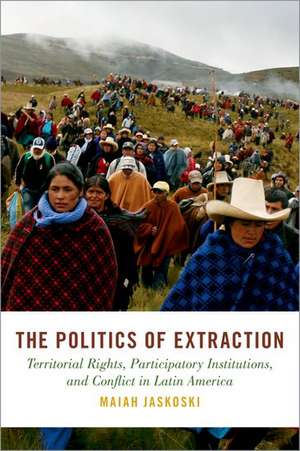The Politics of Extraction: Territorial Rights, Participatory Institutions, and Conflict in Latin America: STUDIES COMPAR ENERGY ENVIRON POL SERIES
Autor Maiah Jaskoskien Limba Engleză Hardback – 14 oct 2022
Preț: 439.09 lei
Preț vechi: 486.24 lei
-10% Nou
Puncte Express: 659
Preț estimativ în valută:
84.09€ • 86.64$ • 70.44£
84.09€ • 86.64$ • 70.44£
Carte disponibilă
Livrare economică 22-28 ianuarie
Preluare comenzi: 021 569.72.76
Specificații
ISBN-13: 9780197568927
ISBN-10: 0197568920
Pagini: 296
Dimensiuni: 161 x 238 x 23 mm
Greutate: 0.59 kg
Editura: Oxford University Press
Colecția OUP USA
Seria STUDIES COMPAR ENERGY ENVIRON POL SERIES
Locul publicării:New York, United States
ISBN-10: 0197568920
Pagini: 296
Dimensiuni: 161 x 238 x 23 mm
Greutate: 0.59 kg
Editura: Oxford University Press
Colecția OUP USA
Seria STUDIES COMPAR ENERGY ENVIRON POL SERIES
Locul publicării:New York, United States
Recenzii
This book is an outstanding analysis of one of the most urgent issues in Latin American politics: the impact of new participatory institutions on the conflict between extractive companies and nearby communities...This book is an outstanding analysis of one of the most urgent issues in Latin American politics: the impact of new participatory institutions on the conflict between extractive companies and nearby communities.
Can participatory institutions coexist with extractive development? What is the role of participatory institutions such as consulta previa, consulta popular, and environmental impact assessments when extractive conflicts arise between local communities and companies? In a comparative study of thirty major conflicts over oil and mining extraction in Bolivia, Peru, and Colombia, Jaskoski masterfully dissects the way participatory institutions work (or not) in different societal and state contexts. This book is a major contribution to the literatures on participatory institutions and extractivism.
Jaskoski pulls off two difficult tasks simultaneously: she offers a remarkable array of 30 detailed case studies of community responses to extractive projects and an innovative framework that makes sense of their diversity. This is an unmissable tour de force that illuminates both the civil society movements and the institutions they work through and around, important for scholars of Latin America and beyond.
At last, a book that brings into sharp focus the full range of difficult issues that afflict participatory institutions ostensibly designed to bring justice to communities in conflict over large-scale extractive development projects. The precision, clarity, and richness of the analysis, combined with the comprehensive nature of the work, make it a 'one-stop shop' for understanding the promise, perils, and disappointments of these innovative institutions for communities.
For well over a decade, Maiah Jaskoski has been a keen observer of conflicts surrounding extractive industries in the Andean countries. This book combines her sharp eye for detail with a comparative analysis of thirty of the region's most iconic conflicts over resource extraction. She uses this empirical depth to engage with scholarship on participatory institutions and conflict dynamics and delivers novel and important insights for literatures on institutional change, contentious politics, and extractive industry governance. A substantial contribution.
Can participatory institutions coexist with extractive development? What is the role of participatory institutions such as consulta previa, consulta popular, and environmental impact assessments when extractive conflicts arise between local communities and companies? In a comparative study of thirty major conflicts over oil and mining extraction in Bolivia, Peru, and Colombia, Jaskoski masterfully dissects the way participatory institutions work (or not) in different societal and state contexts. This book is a major contribution to the literatures on participatory institutions and extractivism.
Jaskoski pulls off two difficult tasks simultaneously: she offers a remarkable array of 30 detailed case studies of community responses to extractive projects and an innovative framework that makes sense of their diversity. This is an unmissable tour de force that illuminates both the civil society movements and the institutions they work through and around, important for scholars of Latin America and beyond.
At last, a book that brings into sharp focus the full range of difficult issues that afflict participatory institutions ostensibly designed to bring justice to communities in conflict over large-scale extractive development projects. The precision, clarity, and richness of the analysis, combined with the comprehensive nature of the work, make it a 'one-stop shop' for understanding the promise, perils, and disappointments of these innovative institutions for communities.
For well over a decade, Maiah Jaskoski has been a keen observer of conflicts surrounding extractive industries in the Andean countries. This book combines her sharp eye for detail with a comparative analysis of thirty of the region's most iconic conflicts over resource extraction. She uses this empirical depth to engage with scholarship on participatory institutions and conflict dynamics and delivers novel and important insights for literatures on institutional change, contentious politics, and extractive industry governance. A substantial contribution.
Notă biografică
Maiah Jaskoski is Associate Professor of Political Science at Northern Arizona University. She specializes in environmental and indigenous politics, military roles, security privatization, and borders, in Latin America. She is the author of Military Politics and Democracy in the Andes and numerous academic journal articles. She also co-authored and co-edited American Crossings: Border Politics in the Western Hemisphere.



